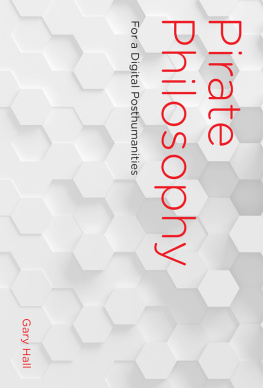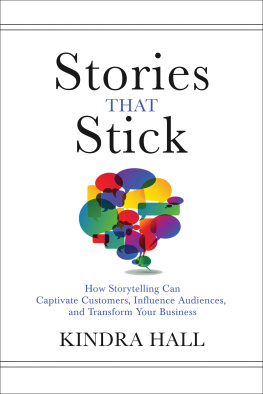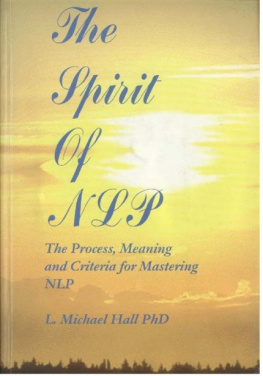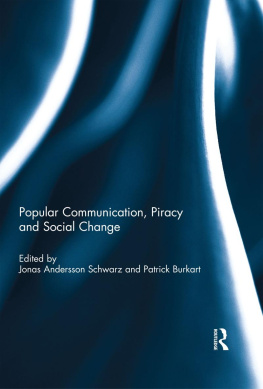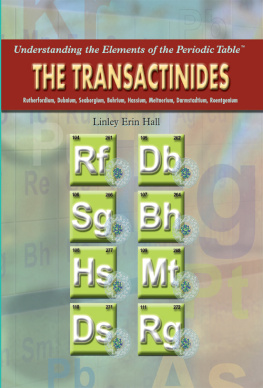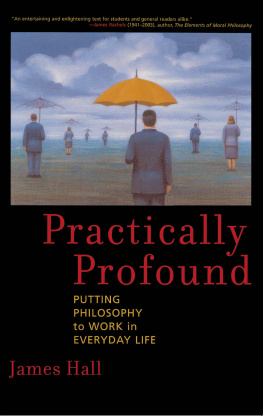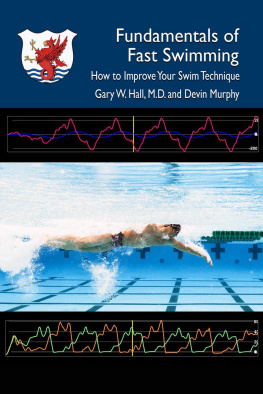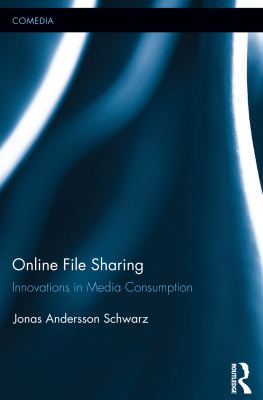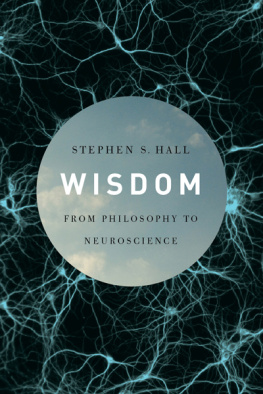Leonardo
Roger F. Malina, Executive Editor
Sean Cubitt, Editor-in-Chief
Closer: Performance, Technologies, Phenomenology, Susan Kozel, 2007
Video: The Reflexive Medium, Yvonne Spielmann, 2007
Software Studies: A Lexicon, Matthew Fuller, 2008
Tactical Biopolitics: Art, Activism, and Technoscience, edited by Beatriz da Costa and Kavita Philip, 2008
White Heat and Cold Logic: British Computer Art 19601980, edited by Paul Brown, Charlie Gere, Nicholas Lambert, and Catherine Mason, 2008
Rethinking Curating: Art after New Media, Beryl Graham and Sarah Cook, 2010
Green Light: Toward an Art of Evolution, George Gessert, 2010
Enfoldment and Infinity: An Islamic Genealogy of New Media Art, Laura U. Marks, 2010
Synthetics: Aspects of Art & Technology in Australia, 19561975, Stephen Jones, 2011
Hybrid Cultures: Japanese Media Arts in Dialogue with the West, Yvonne Spielmann, 2012
Walking and Mapping: Artists as Cartographers, Karen ORourke, 2013
The Fourth Dimension and Non-Euclidean Geometry in Modern Art, revised edition, Linda Dalrymple Henderson, 2013
Illusions in Motion: Media Archaeology of the Moving Panorama and Related Spectacles, Erkki Huhtamo, 2013
Relive: Media Art Histories, edited by Sean Cubitt and Paul Thomas, 2013
Re-collection: Art, New Media, and Social Memory, Richard Rinehart and Jon Ippolito, 2014
Biopolitical Screens: Image, Power, and the Neoliberal Brain, Pasi Vliaho, 2014
The Practice of Light: A Genealogy of Visual Technologies from Prints to Pixels, Sean Cubitt, 2014
The Tone of Our Times: Sound, Sense, Economy, and Ecology, Frances Dyson, 2014
The Experience Machine: Stan VanDerBeeks Movie-Drome and Expanded Cinema, Gloria Sutton, 2014
Hanan al-Cinema: Affections for the Moving Image, Laura U. Marks, 2015
Writing and Unwriting (Media) Art History: Erkki Kurenniemi in 2048, edited by Joasia Krysa and Jussi Parikka, 2015
Control: Digitality as Cultural Logic, Seb Franklin, 2015
New Tendencies: Art at the Threshold of the Information Revolution (19611978), Armin Medosch, 2016
Screen Ecologies: Art, Media, and the Environment in the Asia-Pacific Region, Larissa Hjorth, Sarah Pink, Kristen Sharp, and Linda Williams, 2016
Pirate Philosophy: For a Digital Posthumanities, Gary Hall, 2016
See http://mitpress.mit.edu for a complete list of titles in this series.
Pirate Philosophy
For a Digital Posthumanties
Gary Hall
The MIT Press
Cambridge, Massachusetts
London, England
2016 Massachusetts Institute of Technology
All rights reserved. No part of this book may be reproduced in any form by any electronic or mechanical means (including photocopying, recording, or information storage and retrieval) without permission in writing from the publisher.
This book was set in Stone Sans and Stone Serif by Toppan Best-set Premedia Limited. Printed and bound in the United States of America.
Library of Congress Cataloging-in-Publication Data
Names: Hall, Gary, 1962 author.
Title: Pirate philosophy for a digital posthumanities / Gary Hall.
Description: Cambridge, MA: The MIT Press, 2016. | Series: Leonardo book series | Includes bibliographical references and index.
Identifiers: LCCN 2015039700 | ISBN 9780262034401 (hardcover : alk. paper)
eISBN 9780262332200
Subjects: LCSH: HumanitiesTechnological innovations. | HumanitiesResearch. | Communication in learning and scholarshipTechnological innovations. | Scholarly publishingTechnological innovations. | Open access publishing.
Classification: LCC AZ195 .H35 2016 | DDC 001.3dc23 LC record available at http://lccn.loc.gov/2015039700
10987654321
This one is for Mark Poster
Series Foreword
Leonardo/International Society for the Arts, Sciences, and Technology (ISAST)
Leonardo, the International Society for the Arts, Sciences, and Technology, and the affiliated French organization Association Leonardo have some very simple goals:
- To advocate, document, and make known the work of artists, researchers, and scholars developing the new ways that the contemporary arts interact with science, technology, and society.
- To create a forum and meeting places where artists, scientists, and engineers can meet, exchange ideas, and, when appropriate, collaborate.
- To contribute, through the interaction of the arts and sciences, to the creation of the new culture that will be needed to transition to a sustainable planetary society.
When the journal Leonardo was started some forty-five years ago, these creative disciplines existed in segregated institutional and social networks, a situation dramatized at that time by the two cultures debates initiated by C. P. Snow. Today we live in a different time of cross-disciplinary ferment, collaboration, and intellectual confrontation enabled by new hybrid organizations, new funding sponsors, and the shared tools of computers and the Internet. Above all, new generations of artist-researchers and researcher-artists are now at work individually and collaboratively bridging the art, science, and technology disciplines. For some of the hard problems in our society, we have no choice but to find new ways to couple the arts and sciences. Perhaps in our lifetime we will see the emergence of new Leonardos, hybrid creative individuals or teams that will not only develop a meaningful art for our times but also drive new agendas in science and stimulate technological innovation that addresses todays human needs.
For more information on the activities of the Leonardo organizations and networks, please visit our websites at http://www.leonardo.info/ and http://www.olats.org.
Roger F. Malina
Executive Editor, Leonardo Publications
ISAST Governing Board of Directors: Nina Czegledy, Greg Harper, Marc Hebert (Chair), Gordon Knox, Roger Malina, Tami Spector, Darlene Tong.
Acknowledgments
Many of the ideas contained in this book were developed while I was visiting fellow in the Centre for Research in the Arts, Humanities and Social Sciences (CRASSH) at the University of Cambridge and visiting professor at the Hybrid Publishing LabLeuphana Inkubator, Leuphana University, Germany. I thank my friends and colleagues at both institutions for their intellectual hospitality and generosity. I also presented material that is in this book at the European University Institute, Florence; University of St Andrews; University of Leuven; University of Kent; London School of Economics; Whitchapel Gallery, London; Aarhus University; University of Sussex; Universidad de las Americas, Puebla; University of Beira Interior, Covilh; Eastern Mediterranean University, North Cyprus; Goldsmiths, University of London; University of Birmingham; University of East London; Reina Sofia Museum, Madrid; and Amsterdam Central Library and the Royal Library in the Hague. My thanks to all those who provided me with the gift of feedback, comments, questions, and suggestions on these occasions.
Special thanks are due to Janneke Adema, Mark Amerika, Clare Birchall, Dave Boothroyd, Gabriela Mndez Cota, Alberto Lpez Cuenca, Jeremy Gilbert, Sigi Jttkandt, Sara Kember, Benjamn Mayer Foulkes, Tara McPherson, David Ottina, John Carlos Rowe, Nina Sellars, Doug Sery, Marq Smith, and Stelarc; my colleagues at Coventry; and MITs anonymous reviewers. Extra special thanks are due to Joanna Zylinska, as always.
An earlier version of chapter 2 appeared as Towards a Post-Digital Humanities: Cultural Analytics and the Computational Turn in the Digital Humanities,

